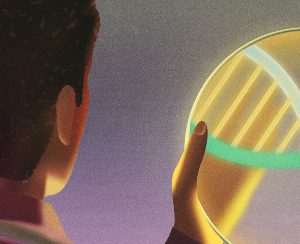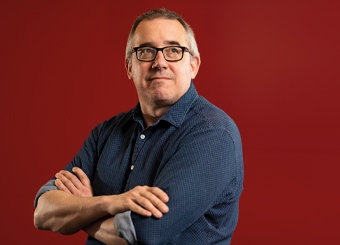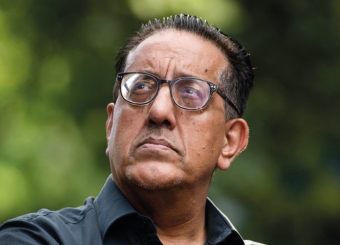The 26th Nobel laureate to come out of The University of Manchester, Professor Simon Johnson, talks to us about his drive to better understand the world, a lifelong passion for history. and the powers of persistence and persuasion in making a difference.
Connecting from his home office, British-American economist and winner of the 2024 Nobel Prize in Economics, Simon Johnson laughs as he recalls how he heard the news about his win. On high-alert after seeing reports online but with no official confirmation from the Academy, he answered a call from a Stockholm number and was met with a surprise greeting:
“Hello, this is Simon Johnson. I’m calling from Stockholm.”
“No, I’m Simon Johnson. You’re calling me!”
In a surreal twist, a Reuters journalist with the same name had been assigned to interview him and it all became “a bit Alice Through the Looking Glass”, he says.
In memory of Alfred Nobel – Swedish chemist and engineer, best known for inventing dynamite – the awards recognise achievements that have conferred the greatest benefit to humankind. Simon, along with his co-collaborators Daron Acemoglu and James A. Robinson, won the 2024 Nobel Prize in Economics for their groundbreaking research on ‘how institutions are formed and affect prosperity’.
The trio’s research explores the vast differences in prosperity between nations. They studied colonialism and the enduring effects of other historical events on global development, and demonstrated that democracies which hold to the rule of law and provide individual rights have spurred greater economic activity over the last 500 years.
Their findings really matter. Not just in theory, but in the real world. The deep and lasting gap between the richest and poorest countries affects billions of lives every day. Their research proves that strengthening democracy and building more inclusive institutions can play a meaningful role in closing that gap.
A passion for the past
As the conversation turns to his earlier years, Simon proudly points out his framed University of Manchester degree certificate hanging behind him. A history buff, his shelves are full of books, or as he puts it, his “library of current projects” and the room is decorated with historical maps, which he finds “absolutely fascinating”.
His passion for the past stems from his childhood in Sheffield in South Yorkshire, where family holidays often meant trips to places such as Ironbridge Gorge World Heritage Site or the National Museum of the Royal Navy. It was these adventures that sparked a lifelong curiosity and thirst for knowledge.
The draw of the north
When asked why he chose Manchester to continue his studies, Simon said: “I’m from the north, and I’ve always been really interested in the future of the north, where the good jobs went and how they can come back”, remembering it as a theme in his own family history. This, along with the University’s prestige and a strong master’s course focused on his area of interest – economic development in low-income countries – brought him up from Oxford to Manchester in the mid 80’s. It wasn’t just academic opportunity that drew him here however – he was also following his heart. His girlfriend was finishing up her degree in Manchester, and “it all just lined up”, he says.
“Manchester is very friendly and an easy place to live. It was a growing experience for me – it was lively and interesting, there were lots of ideas bubbling around.”
I’m from the north, and I’ve always been really interested in the future of the north, where the good jobs went and how they can come back.
He studied for an MA in Economics (Distinction) from 1984-85 before moving to the US on a full scholarship, and earning his PhD at the Massachusetts Institute of Technology (MIT) in 1989. It was in Cambridge, Massachusetts that Simon eventually settled, though his gentle transatlantic accent still gives a nod to his British roots after all these years.
Now 30 years into his time at MIT, he reflects on the important and long-lasting role of academia in innovation and progress: “There’s a lot of discussion about the role science plays in innovation, manufacturing and commercialisation. We have brilliant technologists who would love to commercialise their ideas and get them out into the world. American universities have been good at this, and Manchester has moved a lot in this direction too.”
He believes it’s these solutions, along with the adoption of artificial intelligence, that will help to bring better solutions for society, while helping to “create good jobs” and allowing people to make “meaningful choices over their lives”.
-(Needs-permission-for-use)-700x466.jpg)
Professor Simon Johnson, by Melissa Lyttle/IMFPhoto
Seeking the answers
Reflecting on his career, Simon mentions waiting an unusually long time to be tenured (a permanent academic position in the US). Back in his Oxford days, however, he was known for his persistence or as one tutor called it, “bloody-mindedness”. “I said to him, could we call this tenacity instead of bloody-mindedness? But yes, I don’t like to give up,” he admits. This tenacity aligns perfectly with his research: "It involves a lot of perspectives, trying to bring them together and then quantitatively and persuasively coming up with new interpretations.”
It’s not always just about the analytics – “there’s a certain amount of opportunity to help people think clearly. You can persuade some people with mathematics, some with econometrics, and other people, you just have to persuade them with words”, he says.
It was a short conversation with Daron Acemoglu at MIT that proved to be the turning point – the missing piece that brought everything into sharper focus. Simon was trying to understand the dynamics of post-communist countries and why there were phenomena that were hard to explain with standard macroeconomics.
“It was clear there were other things going on. How does corruption play a role? Why are so many people in the underground economy? Why is the tax system suppressing private enterprise?” he reflects.
Daron’s similar interests in the colonial experience and the discovery – following six months of digging – of robust data about the mortality rates faced by Europeans across the world at the time of colonisation, proved to be the missing pieces, or as Simon puts it, “in American academia, what they call a ‘home run’”. Their collaboration, along with James A. Robinson, quickly evolved into a dynamic partnership, with the three regularly “going to bat” together on research papers that combined rich data with thoughtful interpretation. By drawing on a wide range of perspectives and working to make sense of complex information, they found new ways to shed light on longstanding questions.
For Simon, it reaffirmed how powerful analytical tools – whether rooted in mathematics or econometrics – can be when used wisely: not just to crunch numbers, but to help people see the world more clearly.
After, in his words, “chip, chip, chipping away for a long time”, suddenly Simon broke through. In 2002 he received tenure and in 2004 he was appointed the Ronald A Kurtz Professor of Entrepreneurship at the MIT Sloan School of Management. Shortly after, he assumed the high-profile role of Chief Economist of the International Monetary Fund (IMF), serving from 2007 to 2008.
New doors, new questions
Now 62, he still feels young with lots of momentum, turning down a flurry of post-Nobel speaking invitations to focus on the work he still wants to do. The prize has opened new doors but it’s by no means a free pass.
“You can’t walk into a room in Washington, Capitol Hill or the executive branch and say: 'I’ve got a Nobel Prize, so you should all listen to what I have to say.' No, it has to be persuasive. You have to do the numbers. You’ve got to understand the arguments,” he says.
Winning the Nobel Prize has, however, given new access to funding and the opportunity to explore fresh ground in areas like AI and public health.
“The thinking is that AI is going to change a lot of things. But which way is it going to go? Is it going to be automation that simply replaces people? Or does it just extend your capabilities? And why do we go one direction versus another?” It’s these questions that continue to fuel Simon’s passion.
The Nobel club is fairly small, so it’s also given him access to a close-knit circle of fellow laureates, including Google DeepMind’s Demis Hassabis, who Simon describes as “a great hero for the UK”.
At more than 200 years old, The University of Manchester must also keep its eyes on the global pitch – and Simon remains a proud supporter. He speaks warmly of his time in Manchester’s economics department: “They were very supportive, very friendly people,” he says. “I really enjoyed my time there.”
And with that, we leave Simon among his historical maps, still plotting the ideas he’s pursuing next – and with one last nod to his alma mater.
“It pains me to say this,” this Sheffield Wednesday fan admits, “but the Manchester football teams are always really, really good”.


.jpg)


